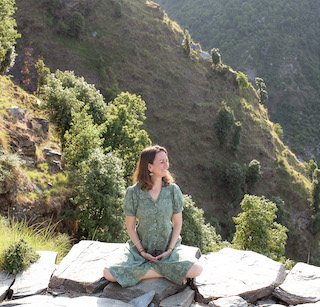Why Asking the Right Questions Matters
Have you ever found yourself repeatedly asking the same big questions, struggling to find the answers?
BIG Questions like “What do I want to do with my life?” or “What is my true path?”
These are the questions that hold deep personal significance but are often challenging to answer.
I’ve come to believe that the nature of our questions can sometimes be the very thing that stands in our way. It boils down to two main issues:
- The question itself may be the wrong one.
- The question is too big and vague—or simply asked at the wrong time.
What I mean is this (an example from outer space)
In The Hitchhiker’s Guide to the Galaxy, humans were obsessed with one burning question: “What is the answer to life, the universe, and everything?” They had a strong desire to finally understand their existence, purpose, and the meaning of life.
Yet, despite countless efforts by philosophers, scientists, researchers, and ordinary people over centuries—even millennia—no one could provide a satisfactory answer.
No amount of thinking and analyzing had been sufficient. It just created more confusion.
They were so determined to find the answer, that they built a supercomputer with the sole purpose of solving this ultimate question. The computer worked for an incredibly long time, hundreds of years, if not again thousands…
Then the day had come! Just as predicted, the computer was getting closer to finishing it’s work. The answer was close, very close, and the humans eagerly awaited the result.
The Vorfreude was gigantic – after all, they expected that all their questions and challenges would be solved soon. Life would make sense if they only knew THE ANSWER to that ONE BIG question about life, the Universe and everything.
And when the moment finally came, the answer the supercomputer provided was… 42.
That’s it. 42.
Naturally, everyone was baffled. How could “42” be the answer to such profound questions?
Nobody could make sense of it.
But the problem became clear: they had focused so much on getting an answer that they hadn’t thought carefully enough about the question itself. They realized that without a proper question, the answer was meaningless.
So, what does this have to do with real life here on planet Earth?
The way I see it, and have experienced it, is that there are two major mistakes we often make when asking questions about our life’s direction and purpose…
1: Asking the wrong question.
How do I find a job that makes me happy, that I find meaningful?
What kind of job would that be, that resonates deeply with my soul mission, my authentic self…?
A question that troubles many of us purpose-led humans.
It is an important one, no doubt about that. But what happens when we are too fixed on finding the answer to that one question?
We limit ourselves. We close out answers that we really need at that moment. That can be stepping stones on our path and that maybe don’t have anything to do with our job or our purpose in the present, but can help us get there in the long-term.
We get distracted and pulled away from what we really need in the present moment.
We get stuck in a tunnel vision.
What I mean is: so often, we get fixated on 1 thing that we THINK needs a solution.
We try to make it happen and when our first attempt fails, we try harder.
We get more judgmental of ourselves for not knowing the answer, even after all those attempts.
All these books we read, the Coaching we take, the applications we send out to numerous companies… We increase the pressure and urgency. Our stress levels rise, and we have difficulty taking our mind off that one thing we try to figure out.
It’s almost like we become obsessed.
The consequence: when we’re in this state of urgency, in fight and flight mode, we can’t think clearly. The very thing we want (clarity) is getting further away from us.
In this state we (our body that is) don’t feel safe and our capacity to come up with new and creative solutions is very limited.
So what we do is, we act as we always have. We apply measures and behaviors that already brought us into the situation and what we get is… more of the same.
2: The Pitfall of Asking Big Questions
Asking ourselves grand questions like “What do I want to do with the rest of my life?” or “What is my life’s purpose?” can often lead to feeling stuck rather than gaining clarity. These questions are overwhelming and can paralyze us, preventing us from taking meaningful steps forward.
The Intimidation at Any Age
When you’re 18 and you´re being told that you should figure out what you want to do with your life, and you try… But how huge and surreal is that question?
How are you supposed to know what the rest of your life should look like?
When you’re 18 and expected to figure out what you want to do with your life, the question can feel enormous and surreal. How are you supposed to know what the rest of your life should look like? The pressure takes the play and exploration out of things—essential elements when we want to be energized and do things that matter to us.
As we get older, such as in our 40s or 50s, the sense of urgency can grow. There may be less time left (who knows…) than when we were 18, and that makes these questions feel even more urgent and overwhelming.
For many, this is a period of re-evaluation and potential rebirth.
However, trying to gain clarity by endlessly repeating these big questions can be unproductive. While it’s true that we have limited time and want to make the best of it, focusing solely on these big questions often highlights the gap between where we are and where we want to be, without providing a clear path to bridge that gap.
Embracing the Flow of Life
Changes come, whether we want them or not. It’s the nature of the world we’re living in.
If we keep asking ourselves these big questions that are supposed to provide answers for the rest of our lives, it’s like trying to channel the natural flow of a river into an artificial riverbed—it just doesn’t flow as smoothly and naturally anymore.
This rigid approach leaves little room for spontaneous adaptation, experimentation, and creativity.
Life is constantly changing, and so can our purpose and what we want to do with our lives. If we focus solely on one or a few big questions without staying connected to what’s actually happening in our lives, we may miss the point. We need to adapt and experiment, not just think ourselves into a solution.Text within this block will maintain its original spacing when published
Life is lived forward and understood backwards.

Cultivating Change and Finding Solutions: A Path Forward
Self-Empowerment Through Smaller Questions
Breaking down big, overwhelming questions into smaller, more manageable ones can help us make progress and find direction without getting lost in the enormity of the answers. This approach relieves pressure, fosters curiosity and play, and brings us back to the present—the only place where we can take action!
Here are some examples of smaller, actionable questions:
- What can I do today (or this week, month) that is meaningful and important to me?
- What new thing do I want to explore this month?
- Which quality of myself do I want to nurture this week?
- How can I be generous just for today?
- How can I be kind to myself just for today?
- What can I do today that brings me joy?
- Which value do I want to practice this week?
These smaller questions are actionable and practical. They empower us to take control of our lives, relieve stress, and rekindle a sense of adventure and exploration.
The Stress and Urgency Loop
While we’re not running from tigers anymore, our nervous system doesn’t differentiate. Today, the tiger is replaced by constant emails, social pressure, societal norms, and everyday stress. Our bodies react as if we’re facing a life-threatening situation, keeping us trapped in a state where genuine, resonant solutions are hard to find. This becomes our baseline stress level. On top of this, we add big, scary questions that we desperately want answers to, which only heightens our stress and urgency.
It’s almost like we’ve become addicted to stress and urgency. We don’t want it, but we’ve gotten so used to it that releasing the pressure almost feels like a threat—very uncomfortable.
What does this do to us? It leaves little room to be open to answers that truly resonate with us. When we’re in fight-or-flight mode, our body and mind become tense, making it nearly impossible to gain clarity or connect with what we truly want and need. In this state, we’re not equipped to come up with ideas and solutions that touch us on a deeply profound level. We just want to “run” and feel safe again. Think about that tiger—if it were right behind you, would you stop and think about whether you really want to run, or if there might be other ways to solve the situation?
What to Do Instead: Self-Care to Escape the Urgency Trap
The idea is simple: get out of the loop so we can feel more present and safe. When we are present, we can tune into what is authentic to us and what we want to bring into the world. What is your passion project? What would you like to express? We need to unlearn the pressure, stress, and societal norms and relearn being authentic. This involves stepping out of the mental hamster wheel we’ve created for ourselves.
Learning to be patient with ourselves, compassionate, and understanding is key. Various modalities, such as breathwork, meditation, and EFT tapping, can help us reconnect with our bodies and gain clarity of mind. EFT tapping, a technique that involves tapping on specific points on the body, can help release emotional blockages, regulate the nervous system, and rewire our brain. These practices enable us to feel safe, grounded, and open to creative and authentic solutions.
By engaging in these practices, we can step out of the urgency loop and into a state of presence. This state allows us to be more receptive to new ideas, impulses, and insights. It helps us focus on what’s right in front of us and what we need right now, rather than getting stuck overthinking about something we might or might not want in the future.
Don’t get me wrong: it’s great and important to have a North Star, a vision that draws us. But it should not take us away from the present moment. This is the only moment where we have the power to take action—action that will move us closer to our North Star or help us realise that the position of our North Star has changed and we need to re-adapt our direction.
To conclude, I want to share a quote by Rainer Maria Rilke that beautifully captures the essence of embracing uncertainty and living in the present:
“Be patient toward all that is unsolved in your heart and try to love the questions themselves, like locked rooms and like books that are now written in a very foreign tongue. Do not now seek the answers, which cannot be given you because you would not be able to live them. And the point is, to live everything. Live the questions now. Perhaps you will then gradually, without noticing it, live along some distant day into the answer.”
